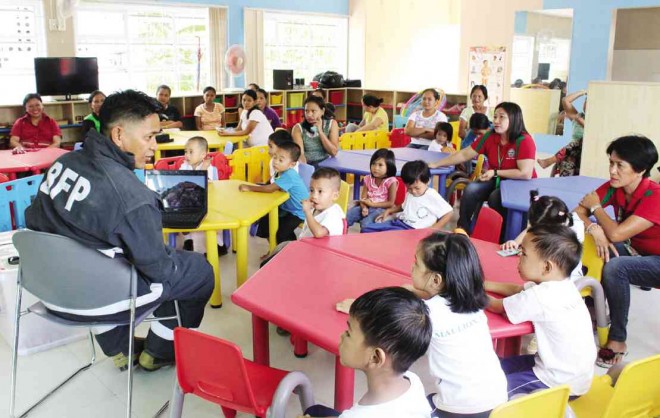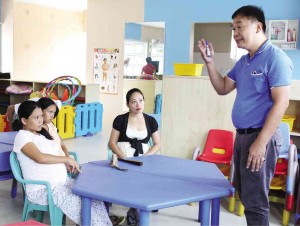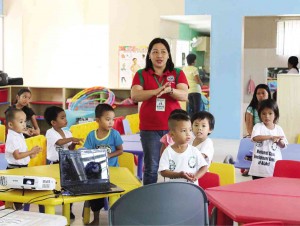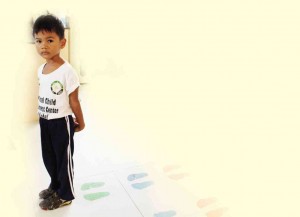Small but formidable center teaches the very young and their mothers

WITH their parents at the back, children listen to Fire Officer 2 Aldrin Flores talk about fire prevention.
ALABEL, Sarangani—In the bulilit center here, children and their mothers attend classes, though separately.
The center is one of 200 across the country, formally known as the National Child Development Centers, established by the Early Childhood Care and Development (ECCD) Council to provide quality preparatory learning for Filipino children ages 4 years and below.
In this center, as well as in those in other parts of the country, babies, as young as 9 months to toddlers under 4 years old, learn their first lessons—from music appreciation and regular hand washing to proper play and coping with temporary separation from parents, among other basic building blocks for lifelong education.
Another class teaches pregnant women proper child care, starting from the prenatal stage to ensure that babies are well cared for even when still in the womb.
“We want to educate children as early as when they are still in the womb,” said Teresita Inciong, ECCD Council executive director and vice chair.
Through Republic Act No. 10410 or the Early Years Act of 2013, the ECCD Council, which is attached to the
Department of Education,
institutionalized early childhood learning and mothers training programs that the government considers necessary to prepare Filipino learners for the “big” school.
“We need to do that because, according to the school readiness assessment (in 2010), only 48 percent of Filipino children were ready for Grades 1 and 2,” said Inciong. “So … they … drop out early because of poor nutrition, while some do not have proper preparation for socialization.”
Betting on the young

CHILDREN learn proper hand washing through a song; (below) Fabio teaches pregnant women the value of regular prenatal checkups.
Despite a zero allocation under the General Appropriations Act or the national budget, the ECCD Council pushed ahead with the construction of bulilit centers, through a P500-million grant from the Philippine Amusement and Gaming Corp.
In partnership with local governments, 200 centers have been opened so far “in various degrees of accomplishment” in 70 of the country’s 81 provinces. Some of the centers are located in far-flung areas.
Next year, the ECCD Council aims to build 300 more bulilit centers.
For Alabel Mayor Corazon Grafilo, the bulilit center in her town was a snug fit for her education-centered governance platform.
“Education is really my priority program. It is important that learners, as young as they are, learn values, how to socialize with other people early,” Grafilo said. “[W]hen they go to the higher grades, they already have a background, an idea (how it is in formal school). Even for adults, I say education is wealth. It cannot be given away and it cannot be stolen.”
The Alabel bulilit center opened in July and has taught a total of 91 children so far. It has four teachers at present, including the mayor’s youngest daughter, Corazon II Estrada, who heads the local center.
“The goal of the ECCD Council is to support the children in their transition from home to the big school. Our lessons depend on the age. Sometimes we do one-on-one lessons because … our learners may be as young as nine months,” said Estrada. “At first, they sit with their parents during class. Gradually, we ask them (parents) to sit … farther [and farther away] so when the children go to the big school, their separation anxiety is not so bad.”
Among the center’s devoted parents is Snooky Lachica, 27, who enrolled her 2-year-old Justin Rayne and 3-year-old John Raven in the ECCD classes.
“It’s to develop their motor skills and to motivate them … so they’ll learn early. When they are bigger, I can just drop them off at school and then I can go and find a job,” Lachica said, as she watched her eldest having lunch during class break.
She said she had seen encouraging signs of growth in her children, with the lessons in class supported by her own structured style of running the household.
“We have time management for them. I ask them to help me water the plants, do chores. At 3 p.m., we review the lessons. I really research and take the time to create a worksheet so they will learn,” said Lachica.
Progress is beginning to show. John Raven, for instance, can “already write his name, knows the numbers 1 to 50, the colors, days of the week in English and Filipino, and months of the year in English.”
Prenatal classes
The center’s other students—the town’s pregnant women—attend classes in prenatal care.
For 36-year-old Elsie Tanodra, lessons at the center are helping see her through her second pregnancy.
“My experience this time is really different because I get tired more easily. I cannot walk (long distances) because of my age,” said Tanodra, who brings along her 10-year-old first-born Charles to the center.
The most important lesson she learned, she said, was the need for more frequent checkups, especially in the final trimester of pregnancy.
“I did not do that before. Many mothers never go back [to the health center] after their first checkup. Our teachers also taught us the importance of proper eating and the right amount of physical activity,” Tanodra said.
 For first-time mother Rosalyn Sabernito, 20, the bulilit center is the main source of knowledge for a neophyte like her, as she lives far from her mother who is in Iligan City. She is in the fourth month of her pregnancy.
For first-time mother Rosalyn Sabernito, 20, the bulilit center is the main source of knowledge for a neophyte like her, as she lives far from her mother who is in Iligan City. She is in the fourth month of her pregnancy.
Among her classmates is soft-spoken Irish Lapiz, 16, who is eight months pregnant with her second child. She had her first baby at 14.
“This is for my baby,” was all Lapiz would say with a shy smile.
With the bulilit center, Alabel’s health officials are able to reach more of the town’s mothers, which is crucial considering that teenage pregnancies are prevalent in the town.
Dr. Honorato Fabio, municipal health officer, said underage mothers account for a third of the annual pregnancies in Alabel.
“[Women] here get pregnant during the teenage years because of their lifestyle and, to some extent, the traditional practices of the indigenous peoples here,” said Fabio.
In some Alabel barangays, all the residents are from the B’laan community.
The rate of maternal deaths was also alarming, 300 for every 100,000 births, six times the “acceptable” rate of 52 per 100,000 births as per World Health Organization standards, said Fabio.
“The lessons we offer here are very important. Unfortunately, there are mothers in the peripheral areas who are hard to gather because they are (uninterested),” said Fabio. “We want to reach more mothers. We should address the shortage in manpower (of healthcare professionals) so we can serve our population better.”















